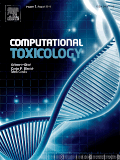
Computational Toxicology
Scope & Guideline
Innovating the future of environmental health through computation.
Introduction
Aims and Scopes
- Quantitative Structure-Activity Relationship (QSAR) Modeling:
Utilizing mathematical and statistical techniques to predict the toxicity of chemical compounds based on their molecular structure, enabling risk assessment without extensive animal testing. - Adverse Outcome Pathways (AOPs):
Developing frameworks that describe the relationship between chemical exposure and adverse health effects, facilitating the understanding of mechanisms of toxicity. - Physiologically-Based Kinetic (PBK) Modeling:
Creating models that simulate the absorption, distribution, metabolism, and excretion (ADME) of chemicals in biological systems, aiding in the prediction of human and environmental exposure. - Machine Learning and Artificial Intelligence Applications:
Employing advanced computational techniques to enhance predictive accuracy in toxicology, including the classification of toxic effects and the identification of potential chemical hazards. - Nanotoxicology and Environmental Toxicology:
Investigating the toxicological implications of nanomaterials and environmental chemicals, focusing on their interactions with biological systems. - Chemical Safety Assessment and Regulatory Frameworks:
Supporting the integration of computational approaches into regulatory practices to ensure the safe use of chemicals in various industries.
Trending and Emerging
- Integration of Big Data and High-Throughput Screening:
The use of large datasets combined with high-throughput screening technologies is on the rise, enabling more comprehensive analyses of chemical toxicity and enhancing predictive models. - Development of New Approach Methodologies (NAMs):
There is a growing emphasis on NAMs, which utilize innovative in silico and in vitro methodologies to enhance the safety assessment process and reduce reliance on animal testing. - Focus on Environmental and Human Health Risk Assessment:
Emerging themes include the assessment of environmental chemicals and their impact on human health, especially in light of increased regulatory scrutiny. - Personalized Toxicology and Risk Assessment:
The incorporation of genetic and biological variability in toxicity assessments is becoming more prevalent, facilitating personalized approaches to toxicological risk management. - Advancements in Computational Methods for Mixture Toxicology:
Research is increasingly addressing the complexities of chemical mixtures and their combined effects, reflecting a more holistic approach to toxicology.
Declining or Waning
- Traditional In Vivo Toxicology Studies:
There is a noticeable reduction in reliance on traditional animal testing methods as computational approaches gain traction, reflecting a broader acceptance of in silico predictions. - Basic Toxicity Screening Methods:
Basic screening methods that do not leverage advanced computational techniques are becoming less prominent, as more sophisticated models provide better predictive capabilities. - Single Endpoint Toxicity Assessments:
The shift towards integrated approaches that consider multiple endpoints and mechanisms of action has led to a decline in the publication of studies focused solely on single toxicity endpoints.
Similar Journals
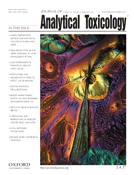
JOURNAL OF ANALYTICAL TOXICOLOGY
Leading the Charge in Toxic Substance DetectionJOURNAL OF ANALYTICAL TOXICOLOGY, published by Oxford University Press Inc, stands as a leading platform in the field of analytical chemistry and toxicology, focusing on the rigorous exploration of methodologies and advancements in the detection of toxic substances. Since its inception in 1977, this journal has continually contributed to the scientific community, providing researchers and professionals with vital insights into chemical health, safety, and environmental implications. With an impressive Q1 ranking in both Analytical Chemistry and Chemical Health and Safety, along with reputable Q2 rankings in Environmental Chemistry and Toxicology, the journal maintains its critical standing in vibrant academic communities, ensuring the dissemination of high-quality research. Although it currently does not offer open access, articles are made available via institutional subscriptions, allowing widespread access to its valuable findings. Located in the United States, the journal contains a wealth of knowledge poised to benefit scientists and scholars engaged in toxicological research, emphasizing its importance in enhancing public health and safety.
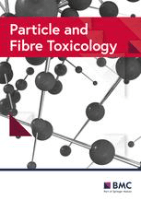
Particle and Fibre Toxicology
Leading the charge in toxicological research.Particle and Fibre Toxicology is a leading open-access journal dedicated to advancing the field of toxicology, specifically focusing on the health impacts of particulate matter and fibers. Published by BMC since 2004, this journal operates from its offices in the United Kingdom and has gained significant recognition in the scientific community, achieving an impressive impact factor that highlights its relevance and influence. As indicated by its Q1 ranking in various categories including Health, Toxicology and Mutagenesis and Medicine (miscellaneous), it occupies a prestigious position in the academic landscape, appealing to researchers, professionals, and students alike. With a Scopus ranking of #4 in Toxicology and #7 in Environmental Science, the journal ensures high visibility and accessibility, providing a platform for the dissemination of key research findings and innovative methodologies in the interdisciplinary domains of toxicology. Through its commitment to open access, Particle and Fibre Toxicology fosters knowledge-sharing and collaboration, facilitating significant advancements in our understanding of the toxicological effects of environmental agents.

Toxicology Research
Connecting researchers to critical toxicological insights.Toxicology Research is a distinguished journal dedicated to advancing the field of toxicology through the dissemination of high-quality research. Published by Oxford University Press, this UK-based journal focuses on critical aspects of toxicology and mutagenesis, highlighting both environmental and pharmacological implications. With an ISSN of 2045-452X and an E-ISSN of 2045-4538, it serves as a valuable resource for researchers, professionals, and students alike. Currently categorized in the Q3 quartile for Health, Toxicology and Mutagenesis, as well as Toxicology in 2023, Toxicology Research maintains a visible presence in Scopus rankings, positioning itself within the targeted professional community. Although the journal operates without open access options, its importance in contributing to scientific discussions and policy formation is undeniable. Covering content from 2012 to 2024, it continues to provide insights into contemporary toxicological challenges, thereby fostering interdisciplinary collaborations and informing best practices in health and safety.

Molecular & Cellular Toxicology
Pioneering research at the crossroads of toxicology and pharmacology.Molecular & Cellular Toxicology, published by the Korean Society Toxicogenomics & Toxicoproteomics (KSTT), is a significant journal in the field of toxicology, providing crucial insights into molecular mechanisms underlying toxic responses. With an ISSN of 1738-642X and E-ISSN 2092-8467, this journal serves as a vital platform for researchers, professionals, and students interested in the latest findings and advancements in toxicology, health, and environmental science. Although it operates under a subscription model, it maintains rigorous peer review standards, contributing to its respectable Q3 classification in Health, Toxicology and Mutagenesis, and its Q2 standing in Pharmacology, Toxicology, and Pharmaceutics. The journal, intersecting with innovative aspects of pharmacology and public health, aims to foster a deeper understanding of toxicological impacts on cellular processes and overall health. Located in Germany and supported by a dedicated editorial board, Molecular & Cellular Toxicology stands out in the academic community, encouraging interdisciplinary discourse and collaboration to address critical toxicological challenges. Engage with us for cutting-edge research that informs and shapes the future of toxicological science.
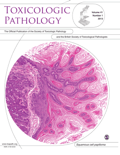
TOXICOLOGIC PATHOLOGY
Unraveling the Mysteries of Substances and Biological SystemsTOXICOLOGIC PATHOLOGY, published by SAGE Publications Inc., is a dedicated journal that serves as a pivotal platform for researchers and professionals in the fields of toxicology and pathology. With an ISSN of 0192-6233 and E-ISSN of 1533-1601, the journal has been committed to advancing knowledge since its inception in 1972. It boasts impressive rankings in the recent 2023 category quartiles, achieving Q2 in Pathology and Forensic Medicine, and Q3 in Cell Biology, Molecular Biology, and Toxicology, marking it as a significant contributor to these vital disciplines. Despite its non-open access status, the journal ensures accessibility through various premium library subscriptions, providing readers with essential insights on toxicologic and pathologic research, advancing both academic inquiry and practical applications. Researchers, students, and industry professionals alike will find TOXICOLOGIC PATHOLOGY an indispensable resource, offering high-quality peer-reviewed articles that explore the complex interactions between substances and biological systems, with the aim of improving public health and safety.

Food Additives and Contaminants Part A-Chemistry Analysis Control Exposure & Risk Assessment
Innovating practices in food analysis and exposure control.Food Additives and Contaminants Part A-Chemistry Analysis Control Exposure & Risk Assessment, published by Taylor & Francis Ltd, is a leading journal in the field of food science, toxicology, and public health. With an ISSN of 1944-0049 and an E-ISSN of 1944-0057, this esteemed publication has established itself as a vital resource for researchers and professionals involved in the analysis and regulation of food additives and contaminants. Since its inception and through its converged years from 2008 to 2012 and again from 2014 to 2023, the journal has maintained an impactful presence, notably achieving a Q2 ranking in diverse categories including Chemistry (miscellaneous) and Food Science, alongside commendable standings in Health and Environmental Health. The journal’s mission is to foster high-quality research by providing a platform for critical studies related to chemical analysis, exposure assessments, and risk management in food safety. By prioritizing engaging, peer-reviewed content, it aims to enhance understanding and mitigate risks associated with food additives, making it an indispensable tool for academics, practitioners, and policymakers alike.
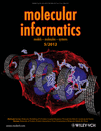
Molecular Informatics
Exploring the Intersection of Chemistry and Computational ScienceMolecular Informatics is a prestigious journal published by WILEY-V C H VERLAG GMBH, dedicated to advancing the fields of computational analysis and molecular modeling. As a key resource in the realms of Computer Science Applications, Drug Discovery, Molecular Medicine, Organic Chemistry, and Structural Biology, this journal is recognized for its significant contributions and is ranked in the Q2 and Q3 categories across multiple disciplines, positioning it among the leading journals for researchers and academics. With an impressive track record since its inception in 2010 and converging its contributions until 2024, Molecular Informatics aims to bridge the gap between computational techniques and biological applications, promoting interdisciplinary collaboration and innovation. Accessible to a global audience, the journal reflects a commitment to advancing science through open access options, making cutting-edge research available to students, professionals, and decision-makers alike. This journal serves as an indispensable platform for disseminating high-quality research and fostering the development of new theoretical and practical frameworks in molecular informatics.
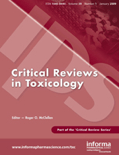
CRITICAL REVIEWS IN TOXICOLOGY
Illuminating the Complexities of Toxicity and Risk AssessmentCRITICAL REVIEWS IN TOXICOLOGY, published by Taylor & Francis Ltd, stands as a preeminent journal within the field of toxicology, boasting an impressive Q1 ranking and holding the distinction of being ranked 12th out of 133 in the toxicology category according to Scopus, placing it in the top 91st percentile. With a continuous publication history since 1971 and a commitment to providing high-quality reviews, the journal offers critical insight into the latest research and advancements in toxicological sciences. While it is not an open-access journal, it provides numerous access options for both subscribers and institutions, ensuring that its extensive articles are widely available to the academic community. The journal's objectives are to disseminate comprehensive reviews that foster understanding and innovation in the assessment of chemical risks, environmental impacts, and the mechanisms of toxicity, making it an invaluable resource for researchers, professionals, and students dedicated to the science of toxicology.
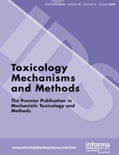
TOXICOLOGY MECHANISMS AND METHODS
Fostering critical discourse in toxicology and risk assessment.TOXICOLOGY MECHANISMS AND METHODS is a distinguished peer-reviewed journal dedicated to the advancement of toxicological research, published by Taylor & Francis Ltd. With its ISSN 1537-6516 and E-ISSN 1537-6524, this esteemed journal features critical studies and innovative methodologies in the field of toxicology, aligning with its mission to enhance understanding of biological mechanisms and risk assessment. The journal holds a commendable Q2 ranking in both the Health, Toxicology and Mutagenesis, and Toxicology categories, as well as strong positions in Scopus rankings, reflecting its influence with a 71st percentile rank in Toxicology and a 69th percentile rank in Environmental Health. Researchers, professionals, and students in the toxicology domain will find this journal to be an invaluable resource, offering open access options that foster widespread dissemination of its findings. Since its inception, encompassing converged years from 1991 to 1995 and from 2002 to 2024, the journal remains at the forefront of critical discourse and innovative research methods, making it a vital platform for advancing toxicological science globally.

CHEMICAL RESEARCH IN TOXICOLOGY
Pioneering research at the intersection of chemistry and safety.Chemical Research in Toxicology is a premier journal published by the American Chemical Society, dedicated to advancing the understanding of toxicological effects associated with chemical substances. Since its inception in 1988, this esteemed journal has maintained a robust impact factor, ranking in the Q1 quartile for both Medicine (miscellaneous) and Toxicology as of 2023, reflecting its significance and influence in the fields of pharmacology and toxicology. With an impressive Scopus ranking at #16 out of 133 in the Toxicology category, it serves as a vital resource for researchers, professionals, and students seeking cutting-edge insights and scholarly articles that bridge the gap between chemistry and toxicological science. Although not an open-access publication, it continues to provide comprehensive analyses and original research that inform safe chemical practices and regulatory policies, further enhancing its role in public health and safety.